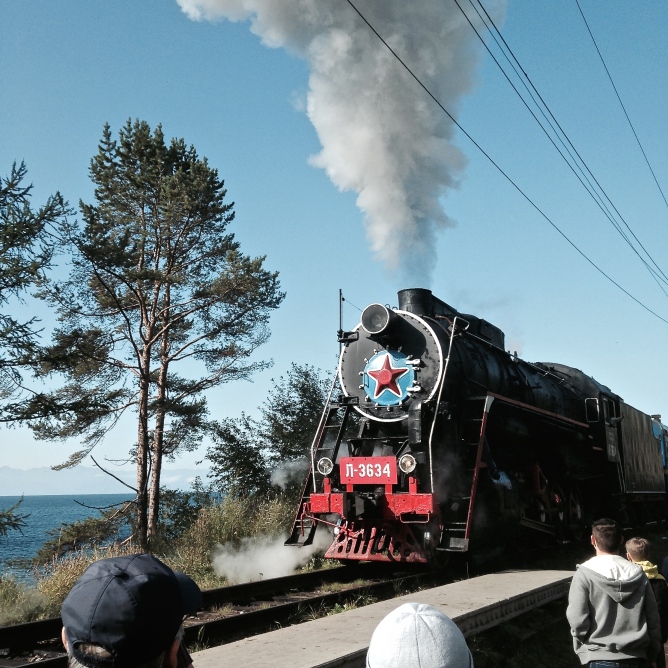
With the Golden Eagle leaving for Irkutsk, we have time to consider the landscape, and the fact that Siberian rivers flow from south to north, towards the Arctic Ocean. Russians often say there is “nothing” north of the Trans-Siberian railway tracks, the taiga forests becoming an empty steppe, due mostly to the freezing permafrost (up to 7mts. deep!) where temperatures can fall to minus 70C.
Travelling overnight and all the next day to Eastern Siberia there is time for the various lectures and briefings, even one on a cooking class to be offered later, and a BBC Nature documentary entitled “The realms of the Russian Bear”.
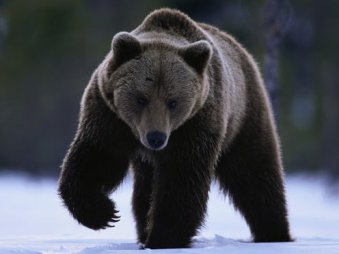 That evening there were cocktails and a special Caviar Dinner. Piano music in the lounge bar brought a discussion on how Moscow composer Boris Tchaikovsky (no relation to Peter Ilyich) was moved to write his symphonic poem on “The Wind of Siberia” (1984), considered a “pictorial masterpiece” by critics. Irkutsk novelist Valentin Rasputin was also mentioned as a controversial environmentalist (maybe stimulated by his own home village, Atalanka, being flooded as part of a major dam project ). He is seen as trying to protect and preserve northeastern Siberia from what Moscow authorities consider as ripe for exploitation or development. We note the stop at Polovina to come. It means “half-way” and is located as a marker station 4644 kms. from Moscow. There are towns with warning names such as Zima (meaning “winter”) before reaching much visited Irkutsk and Baikal, the world’s deepest freshwater lake.
That evening there were cocktails and a special Caviar Dinner. Piano music in the lounge bar brought a discussion on how Moscow composer Boris Tchaikovsky (no relation to Peter Ilyich) was moved to write his symphonic poem on “The Wind of Siberia” (1984), considered a “pictorial masterpiece” by critics. Irkutsk novelist Valentin Rasputin was also mentioned as a controversial environmentalist (maybe stimulated by his own home village, Atalanka, being flooded as part of a major dam project ). He is seen as trying to protect and preserve northeastern Siberia from what Moscow authorities consider as ripe for exploitation or development. We note the stop at Polovina to come. It means “half-way” and is located as a marker station 4644 kms. from Moscow. There are towns with warning names such as Zima (meaning “winter”) before reaching much visited Irkutsk and Baikal, the world’s deepest freshwater lake.
Irkutsk, reached by the railway in 1898, shortly became known as the “Paris of Siberia” for its lively atmosphere and liberal outlook. It is greatly appreciated by the Russians, who do not view train travel as entertaining, find the roads frequently blocked by large, slow moving trucks and prefer to fly in on inexpensive fares. Before the railway, it could take 2-3 years to travel one way from St.Petersburg. Although established as a fort by Cossack fur-trading adventurers, then becoming a raucous gold mining town, it changed greatly after the first Russian Revolt of December 1825. That year, a major Russian generation was sacrificed by deportation,for trying to influence a more liberal Czarist succession. Previously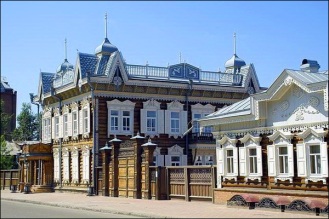 , inconvenient critics such as Romantic writers Lermontov (“A Hero of our Time”) and Pushkin had been sent to the Caucasus to cool off, but this was a more serious matter. The Decembrists, as they became known, came from the Russian elite. Their main leaders were hanged, but large numbers of exiles from aristocratic families were dispersed over Eastern Siberia. They gradually made Irkutsk their principal centre, at the same time transforming cultural awareness in the whole region. A particularly poignant aspect of their exile was the heroic determination of their wives and fiancées who abandoned great wealth, comfort and even their children, to support their rebellious, liberal spouses and create an island of culture in the wilderness ,an aspect which still influences the city today. It is this which is brought out in our Golden Eagle excursions when we see the paintings, portraits and landscapes at the Irkutsk Art Gallery, before visiting some of the carefully preserved wooden houses, long gone in most other cities.
, inconvenient critics such as Romantic writers Lermontov (“A Hero of our Time”) and Pushkin had been sent to the Caucasus to cool off, but this was a more serious matter. The Decembrists, as they became known, came from the Russian elite. Their main leaders were hanged, but large numbers of exiles from aristocratic families were dispersed over Eastern Siberia. They gradually made Irkutsk their principal centre, at the same time transforming cultural awareness in the whole region. A particularly poignant aspect of their exile was the heroic determination of their wives and fiancées who abandoned great wealth, comfort and even their children, to support their rebellious, liberal spouses and create an island of culture in the wilderness ,an aspect which still influences the city today. It is this which is brought out in our Golden Eagle excursions when we see the paintings, portraits and landscapes at the Irkutsk Art Gallery, before visiting some of the carefully preserved wooden houses, long gone in most other cities.
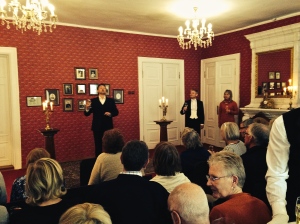
A moment of living past is re-created in the late afternoon with a private concert at the former home of prominent exile Prince Sergei Volkonsky. Well presented, it is an echo of that Decembrist isolation and the music can take a subtle hold, making spectators feel briefly a part of that vanished world, so vital for the exiles. Lev Tolstoy, who studied their lives, saw music as the shorthand of emotion (while his contemporary Nietzsche considered that “without music life would be a mistake”). Soon after, Tolstoy began a novel about the liberal movement that eventually grew into “War and Peace”, in which Sergei Volkonsky is the inspiration for Prince Andrey Bolkonsky in one of the greatest novels ever written.
More recently (2009), Siberia music and exile were the theme of a much awarded film “Le Concert”, which approached the story lightly but culminates in a 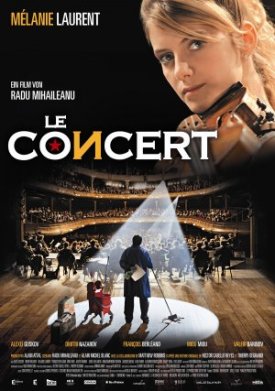 triumphant rendering of Tchaikovsky’s Violin Concerto (it is absolutely worth seeing, at least the final 5 minutes available on You Tube).
triumphant rendering of Tchaikovsky’s Violin Concerto (it is absolutely worth seeing, at least the final 5 minutes available on You Tube).
Tolstoy, of course, became the hero of Boris Pasternak, himself long considered a “father of the Russian dissident movement”. In his Nobel Prize-winning novel “Doctor Zhivago”, the heroine Lara dies in the Gulag, while, in real life, Pasternak’s companion Olga was sent to Siberia and only released after Stalin’s death in 1953. Pasternak felt that “for so long we were ruled by a madman and a murderer”. He also, speaking as Zhivago, compared the bolshevik revolutionaries taking the law into their own hands as being “like a runaway train”.
So, Irkutsk, with its bustling atmosphere, tremendous variety of lake fish and caviar at the markets, as well as its liberal historical heritage, is one of the most memorable stops on our journey. We have dinner, at a family run country home or “dacha”, based on delicious fresh local produce, then our Golden Eagle departs to stop overnight near Sludianka, perfectly positioned for our full visit next day to Lake Baikal, Siberia’s most acclaimed destination.
